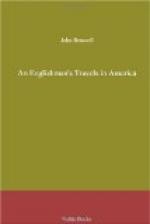As I was strolling towards the canal to take my passage to the Ohio river, a little incident occurred, which, as it illustrates a very old adage, I will not omit. Passing some low-built houses near the canal, my attention was arrested by the screams of a female, who uttered loud cries for assistance.
Hastening to the door of the house from which the alarm proceeded, I lifted the latch in great trepidation, when I saw a man just about to strike a woman (who proved to be his wife) with an uplifted chair. The fellow was vociferating loudly, and appeared in a towering passion. My first impulse was to cry out “Drop it!” when, lo! as if I had, like Katerfelto, the by-gone professor of legerdemain, cried “Presto,” the scene changed, and both man and woman, who were Americans of the lower class, commenced bullying me in right earnest. I made my retreat with some difficulty, as they seemed, both of them, inclined to serve me roughly for my well-intentioned, though, perhaps, mistimed interference. As I made my escape, however, I intimated, pretty loudly, that I should at once apply to a magistrate on the subject, a threat, by-the-bye, that was little regarded, and only increased the showers of abuse levelled at me. As my appealing to a magistrate would be of little avail in the case of a family jar, and would certainly have entailed inconvenience and delay, I did not carry my threat into execution, wondering, at the same time, at my temerity in interfering in a quarrel between man and wife, which I now practically learnt, for the first time in my life, was to incur the unmitigated anger of both, and to learn how true it is that
“Those who in quarrels interpose,
Must oft expect a bloody nose.”
I visited the portion of the town appropriated by the Mormons as a residence. Here, in the midst of their dwellings, they had erected a temple for worship, which, on their emigrating west, their arch-leader, Smith, prophesied would, by the interposition of heaven, be destroyed by fire. The prophecy was verified as to the fact, but heaven had, it appeared, little to do with it; for it was ascertained to be the work of an incendiary of their sect, who was detected and brought to condign punishment.




